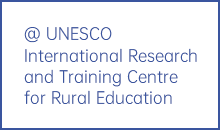The UNESCO International Research and Training Centre for Rural Education (INRULED) commissioned a study on “Education and Training for Rural Transformation:Skills, Jobs, Food and Green Future to Combat Poverty” (May 2012) which provided considerable evidence for the marginalisation of rural populations and the incidence of poverty within rural areas. The report revealed that rural people in general were the most disadvantaged in terms of access to services, including education and training, and were the worst served by infrastructure of various kinds. It asserted that rural people were most likely in many settings to be amongst those who were not being reached in the drive towards the Millennium Development Goals (MDGs). Rural women, in particular, shoulder the burden of the world’s poverty, particularly in the Least Developed Countries (LDCs) and Sub-Saharan Africa. They have been deprived for too long from participating in the opportunities and benefits of economic growth and globalisation.
Most of the rural population depends, directly or indirectly, on small-scale food crop agriculture, fishery, pastoral animal husbandry or rural wage labour associated with plantations and ranches, and ancillary activities linked to the economies of the rural life and rural townships. Many rural families need to diversify their sources of income and employment in view of increasingly smaller land-holdings, low agricultural productivity, volatile weather conditions and soil erosion.
The report argued that most rural people suffer from a lack of training and advisory services that would allow them to upgrade their managerial and technical skills and solve immediate production problems, thus improving productivity and increasing profitability. This is further compounded by governments’ inability to have sufficient budgets to finance the costs of training and advisory institutions. The technicians of public institutions generally do not have the necessary private sector orientation and business spirit to provide practical advice to rural people in particular the rural entrepreneurs.
Education and training are often of inadequate quality. Teachers and trainers may be unqualified, equipment and technology out-dated, and teaching and training methods illsuited to rural contexts. There is an increasing need for:
(1) a flexible work-force capable of being re-trained, perhaps repeatedly;(2) production tasks that increasingly require the application of intelligent judgement to technological tasks and systems rather than dexterity in manual skills;(3) workers to comprehend, interpret and communicate, not between discrete processes but as participants within often intricate human and machine systems; and (4) the emergence of entrepreneurial skills in societies where possibilities seem limitless, but in which increasingly the prevailing culture seldom provides clear references for good practice.
Policies and programmes for education, training, skills development and the creation of jobs therefore cannot ignore the special conditions and contexts of rural people. Moreover, urbanisation is building new patterns of economic, ecological and social interaction between rural and urban areas. The phenomenon of rural urban migration, for example, is both a problem and an opportunity. A well-designed transformational process that builds skills and capacities and applies an ecological perspective can be positive and mutually beneficial for both urban and rural people.
Technical and vocational education and training and skills development, together with basic and adult education, are vitally important for building a sustainable future based on youth employment, poverty reduction, social inclusion in rural communities and respect for the environment. Maximising the contributions of skills development to social and economic progress requires that a broad vision be developed, encompassing a multiplicity of purposes, providers, settings and learners. Skills development, wherever and however it occurs, must be made visible, appreciated, supported and given due attention in policy and action.
With this broad perspective and in view of emerging challenges of the galloping technological revolution, INRULED is developing this training manual to mount innovative training and development programmes for core trainers of the members of local governing bodies and women groups responsible for rural transformation at community level. This initiative requires cooperation between countries to plan and design grassroots-level programmes to prepare Local Government Representatives (LGRs) and representatives of Women Groups to become effective planners, implementers and managers of skills development related activities in rural communities with the aim of: (1) expanding infrastructure and availability of skills development; (2) creating more employment; and(3) improving the quality and relevance of skills development programmes and training.
- Download:
- Training Manual for Local Governance and Women Group Representatives Introduction - Skills and Knowledge for Rural Transformation
- Training Manual for Local Governance and Women Group Representatives Module Ⅰ - Rural Development and Sustainable Livelihoods
- Trainer's Guide Module I - Rural Development and Sustainable Livelihoods.pdf
- Training Manual for Local Governance and Women Group Representatives ModuleⅡ- Poverty,Rural Hunger and Migration
- Trainer's Guide Module Ⅱ - Poverty,Rural Hunger and Migration.pdf
- Training Manual for Local Governance and Women Group Representatives ModuleⅢ- Developing Gainful Opportunities and Growing a Green Future
- Trainer's Guide Module Ⅲ - Developing Gainful Opportunities and Growing a Green Future.pdf
- Training Manual for Local Governance and Women Group Representatives Module Ⅳ - Empowering Women
- Trainer's Guide Module Ⅳ - Empowering Women.pdf
- Training Manual for Local Governance and Women Group Representatives ModuleⅤ- Meeting Special Needs
- Trainer's Guide Module Ⅴ- Meeting Special Needs.pdf
- Training Manual for Local Governance and Women Group Representatives Module Ⅵ - Transformative Role of Local Government Representatives
- Trainer's Guide Module Ⅵ - Transformative Role of Local Government Representatives.pdf
- Training Manual for Local Governance and Women Group Representatives Module Ⅶ - Designing and Organising Training of Local Governance and Women Group Representatives
- Trainer's Guide Module Ⅶ - Designing and Organising Training of Local Governance and Women Group Representatives.pdf
- Training Manual for Local Governance and Women Group Representatives Module Ⅷ - Monitoring,Evaluation,Documentation,Dissemination and Follow-up
- Trainer's Guide Module Ⅷ - Monitoring,Evaluation,Documentation,Dissemination and Follow-up.pdf
- Training Manual for Local Governance and Women Group Representatives Module Ⅸ - Financing Rural Entrepreneurs
- Trainer's Guide Module Ⅸ - Financing Rural Entrepreneurs.pdf
- Training Manual for Local Governance and Women Group Representatives Module Ⅹ- Water,Hygiene,Sanitation and Community Mobilization
- Trainer's Guide Module Ⅹ- Water,Hygiene,Sanitation and Community Mobilization.pdf













